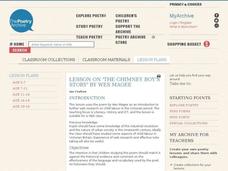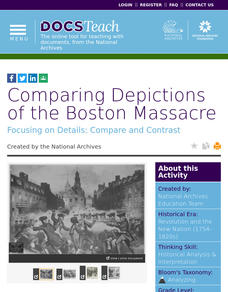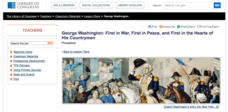Curated OER
Lesson on 'The Chimney Boy's Story' by Wes Magee
Wes Magee's poem "The Chimney Boy's Story" about chimney sweeps/climbing boys is used as an introduction to a lesson that asks groups to research child labor in Victorian Britain.
Curated OER
Reason for the Seasons
Young scientists examine why we have seasons on Earth, and how the motion of the Earth around the Sun causes them. Groups of learners are given a variety of balls, a bamboo stick, a marker, and a flashlight, then use the objects to...
Curated OER
Science: Fossil of a Carbonized Plant
Students classify leaves by shape and margins and use them to create models of plant fossils. By using paper over a leaf, they simulate fossilization of organisms onto sedimentary rocks. Following instructions on worksheets, students...
Curated OER
The Evolution of the Preamble
Reading and comprehending informational text is vital in all subject areas. Upper graders use primary sources and worksheets to better comprehend the historical importance of the Preamble of the US Constitution. Web links, handouts, and...
Curated OER
Orbits Worksheet #1
A diagram of Earth's path around the sun, including the position of the moon, is displayed at the top of the worksheet. Five multiple questions get astronomers to analyze the diagram considering what is going on in the solar system. Use...
Curated OER
Who Wants to be a Millionaire? Solar System
Fifteen questions about our solar system make up this interactive review game. It was written by a teacher in the UK, and therefore the monetary winnings for answering correctly are in pounds. The content applies, however, to any...
Curated OER
Science Jeopardy - The Earth Sciences
The earth sciences are the focus for this Jeopardy-style review game. Categories include geology, space, scientific investigation, meteorology, and oceanography. Diagrams and pictures are involved with most of the questions, making this...
American Chemical Society
Norbert Rillieux, Thermodynamics and Chemical Engineering
The man who invented the earliest examples of chemical engineering was an American-born, French-educated, free man of color before the Civil War, and went on to translate Egyptian hieroglyphics. There is something of...
DocsTeach
Comparing Depictions of the Boston Massacre
Academics compare images of the Boston Massacre to understand differing opinions of the event. Scholars view multiple images, participate in group discussion, and complete a series of written prompts. Young historians gain an...
Smithsonian Institution
War of Independence
Want to explain the War of Independence without using just a textbook? The resource, an online exhibition, provides direct instruction to scholars. It discusses what led up to the war, the time of the war, and the legacy left behind long...
Ford's Theatre
How Perspective Shapes Understanding of History
The Boston Massacre may be an iconic event in American history, but perhaps the British soldiers had another point of view. Using primary sources, including reports from Boston newspapers and secondary sources from the British...
Smithsonian Institution
Latino Patriots
Pupils may not be familiar with Bernardo de Gálvez or Juan Seguín, but these Latinx patriots played important roles in American history. Using biographies of the Revolutionary War hero and Texan politician, historians consider how Latinx...
DocsTeach
Boston Tea Party Image Analysis
Elementary scholars become Sherlock Holmes to analyze a lithograph showcasing the Boston Tea Party. Scholars view the image with some pieces missing and must write an observation. Individuals are then shown the whole image and asked to...
DocsTeach
Excerpts from the Declaration of Independence
What exactly did the Founding Fathers declare? Elementary historians delve into the Declaration of Independence in a fast-paced activity. The resource provides text experts and guided questions to help academics analyze the intent of the...
DocsTeach
Prequel to Independence
It's about time! Young historians use primary sources to create a timeline of events leading to American Independence. The fast-paced activity is designed to be used at the end of a unit on the Revolutionary War or as an assessment tool....
DocsTeach
To Sign or Not to Sign
To sign or not to sign, that is the question. Scholars review the Declaration of Independence and discuss the Framers' decisions for signing the document. The activity uses primary text, a worksheet, and group discussion to help...
Museum of the American Revolution
Hamilton Was Here: Rising Up in Revolutionary Philadelphia
Hamilton may be a hit Broadway show, but there is so much more to learn. An eight-unit resource guides young historians through the life of Alexander Hamilton and the Revolutionary War. The lessons include hands-on-activities, writing,...
Museum of the American Revolution
Object Observation: Purpose on a Powder Horn?
Young archeologists discover the significance of ordinary objects from the past in an interesting lesson on artifact analysis. The activity focuses on examining the image of a powder horn from the Revolutionary War to understand what it...
Center for History Education
The Non-Importation Movement
Boycott for free trade! An eye-opening lesson explores the non-importation movement created by American colonists in response to the Stamp and Sugar Acts. Scholars specifically look at the impact the boycott had on colonial women who had...
Center for History Education
Confronting Third World Nationalism: The United States and the Overthrow of Prime Minister Mossadegh
Not all rebellions are led by the people. An intriguing instructional activity explores the overthrowing of Iranian Prime Minister Mossadegh by the CIA. Scholars view a series of images and read background information to understand the...
Simon & Schuster
A Teacher's Guide to 1776 by David McCullough
David McCullough's Pulitzer Prize-winning novel, 1776, is the focus of a 28-page teacher's guide. The guide includes pre-reading questions, background information about key British and American figures, and chapter-by-chapter lessons.
Library of Congress
George Washington: First in War, First in Peace, and First in the Hearts of His Countrymen
Does the lens of history portray George Washington as a good leader? A three-lesson unit looks at Washington's early military career as the commander of the Virginia Regiment, his role in the fight for independence...
National Endowment for the Humanities
African-American Communities in the North Before the Civil War
Middle schoolers may be surprised to learn that before the American Civil War there were more slaves living in New York than there were in Kentucky! Young historians examine maps and census data to gather statistics about...
Benjamin Franklin Tercentenary
Ingenious: Franklin Assembles a Scientific Community
Few Americans have heard of the burgeoning scientific community known as the America Philosophical society, started by none other than Benjamin Franklin. With inquiry, research, and discussion, high schoolers come to understand their...
Other popular searches
- Scientific Revolutions
- Age of Revolutions
- Latin American Revolutions
- American Revolutions
- Revolutions of 1848
- Revolutions of the 1840s
- Revolutions in Latin America
- Revolutions in Asia
- European Revolutions 1830
- Revolutions of the 1820s
- Latin America Revolutions
- European Revolutions of 1848

























